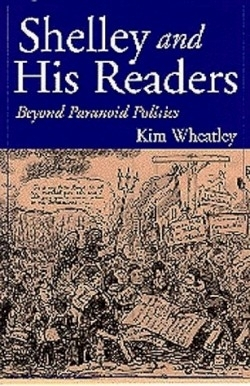Shelley and His Readers
Beyond Paranoid Politics
“We have spoken of Shelley’s genius, and it is doubtless of a high order; but when we look at the purposes to which it is directed, and contemplate the infernal character of all its efforts, our souls revolt with tenfold horror at the energy it exhibits, and we feel as if one of the darkest of the fiends had been clothed with a human body.” This is an example from Wheatley’s book of a literary review of Shelley’s poetry written in a climate of what she calls “paranoid politics.” It exhibits what Wheatley describes as “a heightened language of defensiveness and persecution.” Reviewers writing in the “paranoid style” that Wheatley identifies with the early ninteenth century bemoan the loss of social values, warn readers that by merely reading subversive language they can damage their souls and believe that if such language reaches the masses it can incite social revolution.
In this setting of paranoid politics, Wheatley’s book is about the relationship between the radical, reformist poetry of Percy Bysshe Shelley and the early nineteenth century readers of that poetry: literary reviews of the day and the small circle of Shelley friends and supporters. Wheatley’s prime argument is that the two were inter-dependent. That is, alarmist paranoid reviewers found all their fears justified in Shelley’s radical poetry. And Shelley’s poetry was radical within the specific context set by the paranoid reviewers. They fed and thrived off each other. Wheatley goes on to argue that in reacting to Shelleys later poetry, starting with “Prometheus Unbound,” reviewers and supporters of Shelley together produce “not so much an alternative language as an alternative to politics—the aesthetic.” It is at this point that Shelley’s readers move, as the title suggests, beyond paranoid politics.
Wheatley develops her arguments by examining three Shelley poems in chronological order: “Queen Mab,” “Prometheus Unbound” and “Adonais” as well as reviews of each all in the context of paranoid politics. Scholars and lovers of Romantic poetry will be intrigued by this addition to the Shelley body of study. The uninitiated may be frustrated that Wheatley never places her arguments into a broader context, but that clearly is not her purpose. Wheatley is a precise and clear writer, and she lays out her arguments neatly and specifically, all of which is crucial for arguments of such complexity, especially for lay readers.
Disclosure: This article is not an endorsement, but a review. The publisher of this book provided free copies of the book to have their book reviewed by a professional reviewer. No fee was paid by the publisher for this review. Foreword Reviews only recommends books that we love. Foreword Magazine, Inc. is disclosing this in accordance with the Federal Trade Commission’s 16 CFR, Part 255.

